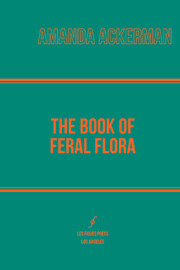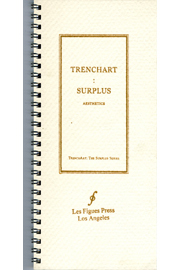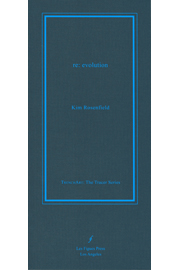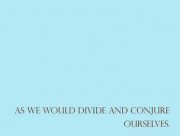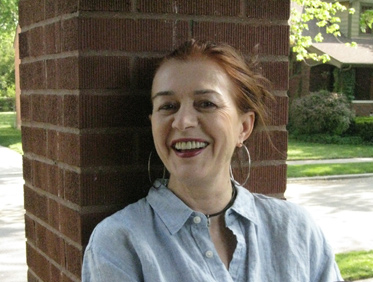For Want and Sound
Melissa Buzzeo
Introduction by Rob Halpern
Cover art by Klaus Killisch
Book 6 of 6, TrenchArt Surplus Series
Poetry | $15.00
ISBN 13: 978-1-934254-40-0
Size: 9.25 x 4.25
Pages: 112
Binding: Softcover, Perfect
BUY NOW at LARB BOOKS
Melissa Buzzeo’s For Want and Sound is a philosophical lyric in two parts. Part I, Book, is fashioned from a series of testimonial statements investigating boundarylessness—in language, in body, in different states of being, in sites of memory and geography—in water. Part II, Breach, Recoil, acts as a kind of embankment to the uncontained, and possibly contaminated, space and water in Part I, creating the possibility for commentary. Juliana Spahr has described Buzzeo’s work as “something shimmering and fully complicated.”
PRAISE FOR FOR WANT AND SOUND:
“Melissa Buzzeo delivers language from its hidden sources and outer fringes with extraordinary poignancy and precision.”
— Avital Ronel
“Melissa Buzzeo embodies contemporary thought as it circulated around the body, when the house, when the given structure: fails. A writer with incredible lyric gifts, Buzzeo has written through trauma, architecture and place to create a work that is completely original and vibrant. For Want and Sound is not simply a test of form; instead, it displays this writer’s willingness to let what is written have its own body, its own intensity, and to track that to the place where materials, cells and communities: explode.”
— Bhanu Kapil
“For Want and Sound is a book about the body and the sentence, at once grammatical and juridical. It concerns language and law, force and longing, and the fate of love that can’t be contained by our sentences, there being no socially sanctioned form for that excess. How is one to communicate a sentence whose subject wants more than grammar allows? And what might this want sound like?”
— Rob Halpern
“D.H. Lawrence wrote that most people come to America ‘to get away from everything that they are and have been.’ How does getting away become a sentence? And how does the sentence continue after getting away? ‘In the early and mid-20th century, a surge of mostly second generation immigrants desiring separation from the city arrived on Long Island,’ writes Melissa Buzzeo. In For Want and Sound, arrival is also a sentence, one without horizon. What want arrives when there is no more want? What kind of body carries place as cellular memory, ambivalence below will? Melissa Buzzeo has written a book that feels impossible and (therefore) embodied as few books are: a narrative that does not take place but must be carried, a narrative of compassion for the narrative which cannot take place.”
—Eleni Stecopoulos


